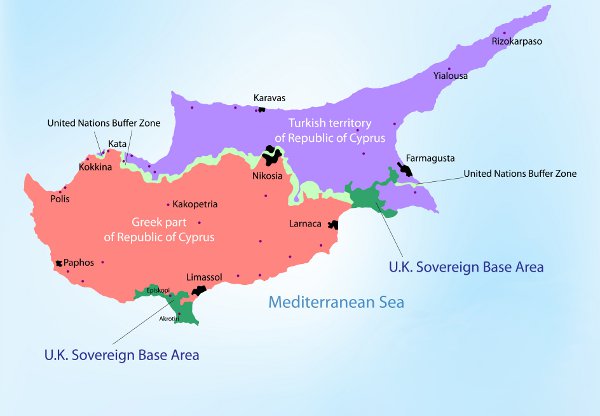CYPRUS

Standing at the crossroads of three continents Cyprus has a vibrant history, a perfect climate and the warmest welcome in the Mediterranean. It has been a British playground for many years offering the perfect combination of relaxation, water sports and exciting exploration along its beautiful coastline, for Northern Cyprus too, has its share of rich archeological sites and medieval castles. It enjoys over 300 days of uninterrupted sunshine, clear blue unpolluted seas, the beauty of an unspoiled landscape and uncrowded beaches.
Add to this the friendliness and hospitality of the people, wonderfully varied cuisine and you have the perfect recipe for a truly idyllic holiday. Whether you are a lover of nature, an archaeologist, a keen walker, a water sportsman or simply a sun-worshipper this little island is the ideal spot for you.
Along the northern coast stretch the pine-clad Kyrenia Mountains sloping gently to the warm and tranquil waters of the Mediterranean.
There are many good restaurants in the area, and picturesque Kyrenia harbour is the place to be in the evening. Famagusta in the east is famed for its endless sandy beaches and crystal-clear waters.
It will come as no surprise that according to legend this island was given to Cleopatra by Julius Ceasar as a token of his love!

Geography
The third-largest island in the Mediterranean (one and one-half times the size of Delaware), Cyprus lies off the southern coast of Turkey and the western shore of Syria. The highest peak is Mount Olympus at 6,406 ft (1,953 m).
Government
Republic. Mediation efforts by the UN seek to reunify the Greek and Turkish areas of the island under one federated system of government.
History
Cyprus was the site of early Phoenician and Greek colonies. For centuries its rule passed through many hands. It fell to the Turks in 1571, and a large Turkish colony settled on the island.
In World War I, at the outbreak of hostilities with Turkey, Britain annexed the island. It was declared a Crown colony in 1925. The Greek population, which regarded Greece as its mother country, sought self-determination and union (enosis) with Greece. In 1955, a guerrilla war against British rule was launched by the National Organization of Cypriot Combatants (EOKA). In 1958, Greek Cypriot nationalist leader Archbishop Makarios began calling for Cypriot independence rather than union with Greece. During this period, Turkish Cypriots began demanding that the island be partitioned between the Greek and Turkish populations.
Cyprus became an independent nation on Aug. 16, 1960, after Greek and Turkish Cypriots agreed on a constitution, which excluded both the possibility of partition as well as of union with Greece. Makarios became the country's first president.
Fighting between Greek and Turkish Cypriots flared up in the early 1960s, and a UN peacekeeping force was sent to the island in 1965. On July 15, 1974, Archbishop Makarios was overthrown in a military coup led by the Cypriot National Guard. On July 20, Turkey invaded Cyprus, asserting its right to protect the Turkish Cypriot minority. Turkey gained control of 30% of northern Cyprus and displaced some 180,000 Greek Cypriots. A UN-sponsored cease-fire was established on July 22, and Turkish troops were permitted to remain in the north. In Dec. 1974, Makarios again assumed the presidency. The following year, the island was partitioned into Greek and Turkish territories separated by a UN-occupied buffer zone.
Turkish Cypriots proclaimed a separate state under Rauf Denktash in the northern part of the island on Nov. 15, 1983, naming it the “Turkish Republic of Northern Cyprus.” The UN Security Council, in its Resolution 541 of Nov. 18, 1983, declared this action illegal and called for withdrawal. No country except Turkey has recognized this entity.
In 1988, George Vassiliou, a conservative and critic of UN proposals to reunify Cyprus, became president. The purchase of missiles capable of reaching the Turkish coast evoked threats of retaliation from Turkey in 1997, and Cyprus's plans to deploy more missiles in Aug. 1999 again raised Turkey's ire.

